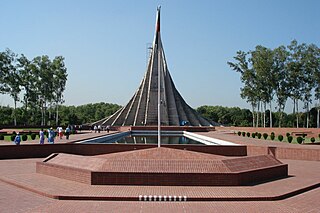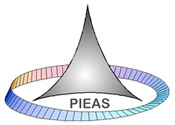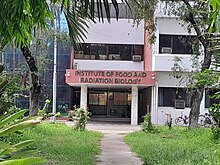
The Bangladesh Armed Forces are the military forces of the People's Republic of Bangladesh. They consist of the three uniformed military services: the Bangladesh Army, the Bangladesh Navy and the Bangladesh Air Force. The Armed Forces are under the jurisdiction of Ministry of Defence of the Government of Bangladesh, and are directly administered by the Armed Forces Division of the Prime Minister's Office. The President of Bangladesh serves as the Commander-in-Chief of the Bangladesh Armed Forces. Bangladesh has the third-largest defence budget in South Asia and according to the Global Firepower index, The Bangladeshi military is the 37th strongest in the world and the third most powerful military force in South Asia. Border Guard Bangladesh and Bangladesh Coast Guard are under the jurisdiction of the Ministry of Home Affairs during peacetime, but during wartime they fall under the command of Bangladesh Army and Bangladesh Navy respectively.

The Bhabha Atomic Research Centre (BARC) is India's premier nuclear research facility, headquartered in Trombay, Mumbai, Maharashtra, India. It was founded by Homi Jehangir Bhabha as the Atomic Energy Establishment, Trombay (AEET) in January 1954 as a multidisciplinary research program essential for India's nuclear program. It operates under the Department of Atomic Energy (DAE), which is directly overseen by the Prime Minister of India.

Pakistan Atomic Energy Commission (PAEC) is a federally funded independent governmental agency, concerned with research and development of nuclear power, promotion of nuclear science, energy conservation and the peaceful usage of nuclear technology.

The Department of Atomic Energy (DAE) is an Indian government department with headquarters in Mumbai, Maharashtra, India. DAE was established in 1954 with Jawaharlal Nehru as its first minister and Homi Bhabha as its secretary.

The Pakistan Institute of Nuclear Science & Technology (PINSTECH) is a federally funded research and development laboratory in Nilore, Islamabad, Pakistan.

Savar is an upazila of Dhaka District in the division of Dhaka, Bangladesh and is located at a distance of about 24 kilometers (15 mi) to the northwest of Dhaka city. Savar is mostly famous for the National Martyrs' Memorial, the national monument for the martyrs of the Liberation War of Bangladesh.

University of South Asia or UNISA is a private university in the Amin Bazar, Savar, Dhaka, Bangladesh. Its curriculum has been approved by the University Grants Commission.

Naiyyum Choudhury was a Bangladeshi biotechnologist and a nuclear scientist. He pioneered the development and adoption of the National Biotechnology policy of Bangladesh. He served as the Chairman of Bangladesh Atomic Energy Commission, and also served in many important positions in Bangladesh. He was serving as the founding Chairman of Bangladesh Atomic Energy Regulatory Authority (BAERA) at the time of his death. He was the Chairman of the Department of Microbiology, Dhaka University, Professor and Coordinator of Biotechnology at BRAC University, and served as faculty member in Jahangir Nagar University and BUET. He was also the IAEA Regional Cooperation Agreement (RCA) Chair person. He was also a fellow of Bangladesh Academy of Sciences (BAS), and was serving as the Vice President of BAS at the time of his death. He was also the contact person for Inter Academic Panel (IAP) of Bangladesh.

M. A. Wazed Miah was a Bangladeshi physicist and the writer of a number of texts in physics and some political history books, a former chairman of the Bangladesh Atomic Energy Commission and husband of Prime Minister Sheikh Hasina.
Padmanabhan Krishnagopala Iyengar, was an Indian nuclear physicist who is widely known for his central role in the development of the nuclear program of India. Iyengar previously served as the director of BARC and former chairman of the Atomic Energy Commission of India, he raised his voice and opposition against the nuclear agreement between India and the United States and expressed that the deal favoured the United States.

Bangladesh Atomic Energy Commission is a scientific research organization

The Pakistan Atomic Research Reactor or (PARR) are two nuclear research reactors and two other experimental neutron sources located in the PINSTECH Laboratory, Nilore, Islamabad, Pakistan.

The Pakistan Institute of Engineering and Applied Sciences (PIEAS), is a public research university located in Islamabad, Pakistan. The university is modelled on international standards with a strong focus on the scientific advancement of the nuclear science-related STEM fields.
Bangladesh first conceived building a nuclear power plant in 1961. The Bangladesh Atomic Energy Commission was established in 1973. The country currently operates a TRIGA research reactor at the Atomic Energy Research Establishment in Savar.

The University of Dhaka is a public research university located in Dhaka, Bangladesh. It was established in 1921 as University of Dacca and it is the oldest active university in Bangladesh.
Atomic Energy Research Establishment School & College, former name A. E. R. E High School, is a school in Savar Upazila, Dhaka, Bangladesh.

The Rooppur Nuclear Power Plant (Bengali: রূপপুর পারমাণবিক বিদ্যুৎকেন্দ্র) is a 2.4 GWe nuclear power plant project in Bangladesh. The nuclear power plant is being constructed at Rooppur of Ishwardi upazila in Pabna District, on the bank of the river Padma, 87 miles (140 km) west of Dhaka. It will be the country's first nuclear power plant, and the first of the two units is expected to go into operation in 2024. The VVER-1200/523 Nuclear reactor and critical infrastructures are being built by the Russian Rosatom State Atomic Energy Corporation. In the main construction period, the total number of employees will reach 12,500, including 2,500 specialists from Russia. It is expected to generate around 15% of the country's electricity when completed.
Iqbal Hussain Qureshi 27 September 1937 – 8 December 2012) SI, FPAS, best known as I.H. Qureshi, was a Pakistani nuclear chemist and an Emeritus professor of chemistry at the University of Karachi. Qureshi was the principal contributor of scientific understanding of various chemical elements: bismuth, cobalt, strontium, thallium, tritium, iron, rubidium, and zinc.
Chaitanyamoy Ganguly is an Indian nuclear scientist and a former head of the Nuclear Fuel Cycle and Materials Section of the International Atomic Energy Agency (IAEA), credited with many innovations in the field of nuclear material science. He was honored by the government of India in 2002, with the fourth-highest Indian civilian award of Padma Shri.

Atomic Energy Centre is the oldest nuclear research centre in Bangladesh and is located in the capital Dhaka. It falls within the campus of University of Dhaka and is under the management of Bangladesh Atomic Energy Commission.

















